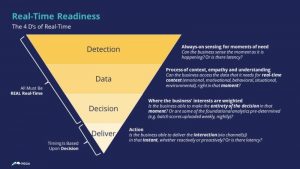Milton Hwang discusses going from engineering to marketing, breaking ground with ecommerce at GE and his experience writing for MarTech.
Our “Spotlight on the expert” series digs deeper into the stories of our expert contributors. This interview has been edited for clarity and length.
Drawing on 30 years of marketing leadership experience, Milton Hwang writes for MarTech about AI, MOps, automation and other topics. He’s also spoken at The MarTech Conference. We spoke about his circuitous path to marketing through electrical engineering and the early days of ecommerce at GE Healthcare, where he worked for many years, reporting to both the CMO and CIO.
Q: How is being a contributor to MarTech different from other kinds of writing you’ve done in the past?
A: It’s different, even though some of the same disciplines apply. Writing an internal research paper for consumption amongst peers — writing within corporate, which basically means writing in “PowerPoint speak” — is so different from writing in the context of contributing to MarTech.
I was out walking the dog and listening to this podcast the other day, and the podcast speaker pinned it. He asked, “Do you think some of that is just the human nature of fear?” Presenting at conferences is very different from a writing forum. And part of that is the fear the podcaster spoke to. You’re putting yourself out there in a way you can’t prepare for in other forums.
Q: How is delivering a talk or sitting on a panel different? I get some of those same feelings about being exposed, with everybody showing up at a public talk.
A: Sign me up any day, I’d rather be on stage presenting! Technically it’s no different because it’s potentially nameless faces you don’t know. But I’m most comfortable speaking in front of a roomful of people because I’m old [laughs] and have 30 years of corporate experience.
I’m second-most-comfortable in a panel conversation. Not because I’m less comfortable on a panel [than delivering a talk], but there’s just a fear of not measuring up to the other panelists, honestly. But in terms of just handling questions off the cuff, no worries about that. I would still put writing at the top of my list (of fears) next to those! [Laughs]
Q: I know speakers who breeze through talks with no notes and love it because they’re so immersed in the subject.
A: I won’t claim all of the expertise, but I will claim the sweat equity of preparing the content. I was very lucky in life. You open a door early in life and have no idea what it will prepare you for. I was in high school debate and forensics. My high school Comms teacher happened to be the forensics and debate coach. I effectively showed up to an afterschool meeting because it was her. And years later, that contributed to my ease with speaking impromptu and with a prepared piece of content, without notes. I learned that if you were a subject matter expert it was better without notes. I don’t know if I had other opportunities to write and just turned them down, but I always gravitated toward public speaking.
Q: Were marketing and technology interests of yours at that time?
A: Retrospectively. I’m a non-traditional marketer in that I actually started in electrical engineering. Not exactly the most common career path for a marketer. And I’m a big advocate for it all being a journey of twists and turns! I do believe in my heart of hearts that I was meant to be a marketer, but I didn’t have the self-confidence at the time. The alternate path I considered because of my debate and forensics background was law. But I do believe I was meant to be a marketer, and I got my opportunity to do that within GE, during my long career there.
I found my way into GE as a summer intern. They certainly hire you based on your background, but once you get your foot in the door it doesn’t matter. So they let me become a marketer and sponsored my MBA while I was there.
Q: What work did you do when you started at GE? What background was GE interested in?
A: The underpinning of my background in engineering is problem solving. The way I think is in systems and flow charts. I found myself in a number of operational roles and people noticed my “systems” mind. I got into marketing because somebody took a chance and gave me a shot. GE Healthcare was an extremely high-technology product — all the marketers had an extremely technical background. If you were marketing a high-tech MRI machine or CT scanner, and you were selling to a technical, medical audience, you had to be conversant with the engineering team.
I got myself into roles on the operational side that got me involved with what we would now call the client experience. And I thought, “That’s where the action is.” I wanted to get as close as possible to the customer. And my vehicle for communicating that was marketing.
Q: What aspects of product development carried over to the customer?
A: The specific transition was learning how to speak to customer benefits and customer value. The majority of my last 15 years at GE (I left nine years ago) I was reporting to both the CMO or CRO roles, as well as to the CIOs.
Q: How did you get into digital marketing at GE?
A: In the late 1990s I was part of GE Healthcare’s first ecommerce team. We built their first public websites. That was the transition, and it was like stepping off a cliff. I had found myself in marketing, exactly where I wanted to be, then suddenly there was this dot-com boom happening. At the time, ecommerce wasn’t considered marketing — it was something else and we didn’t know what to call it. But I thought it could be a big thing and I wanted to be a part of it. So I left marketing and went into ecommerce. And the rest was history. I took on a number of different titles — marketing ops, revenue ops. Really the instigation for this work over the last 25 years was the original ecommerce days. I’m an old dog in digital! [Laughs]
Q: Would you say it’s still about customer value today?
A: Yes, it’s absolutely about customer or business value. But I feel like we as marketers, myself included, have gone astray. Digital [channels and data] allowed us to get inside the minds of our customers, yet we forgot that at the end of the day it was about driving customer value, not just the infamous click-through. How about not chasing click-through and open rates and instead measuring engagement by a meeting, right? I’ve been in sales support for 25 of my 30 years in marketing. You’re not driving value and it’s not a legitimate opportunity until you can get a live, in-person or Zoom meeting with a prospect. That’s your indicator that you’re starting to actually provide some value.
Q: How is the world around customer value changing with new AI technology?
A: What’s going to change is the underlying process of writing, editing and then distributing content. We’ve been under a period of relative stability for the last 10 or so years. We’ve developed these massive workflows — between marketing and sales and also between marketers themselves, the campaign team, the content team, the marketing ops team. We’ve stabilized the swim lanes of who does what. AI is going to disrupt those. It won’t change the fundamental questions about what marketing does, but it will disrupt those swim lanes in a way we’re not prepared for and faster than we expect.
The post Milton Hwang: Spotlight on the expert appeared first on MarTech.
MarTech(17)
Report Post




